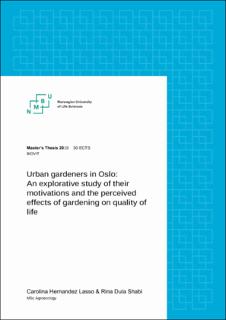Urban gardeners in Oslo : an explorative study of their motivations and the perceived effects of gardening on quality of life
Master thesis
Permanent lenke
https://hdl.handle.net/11250/2647022Utgivelsesdato
2019Metadata
Vis full innførselSamlinger
- Master's theses (IPV) [240]
Sammendrag
Urban agriculture has been associated with social, emotional, health and mental health benefits. However, literature describing the relationship between garden participation and effects on quality of life has not been fully addressed in the Norwegian setting. The city of Oslo has set important goals for the development of a more inclusive and livable city, and urban agriculture has achieved a place on the agenda to accomplish such ambition. Since then, multiple gardening initiatives have developed, along with research projects studying their process. Case studies and interview-based research have been conducted before. However, this explorative study aims to provide a different angle. A mixed method research approach was applied, using a cross sectional survey, participant observation, informal conversation notes and secondary data. To understand the perceived benefits of gardening on well-being, two groups of participants were studied, gardeners (n=102) and visitors (n=46) from seven community gardens in Oslo. Based on the Capability Approach by Nussbaum, a list of activities was built to create an overview of the most important activities for gardeners. To study their effect and motivation, three capabilities from the Capability Approach were applied. In addition, the Attention Restoration Theory by Kaplan was adopted to understand the restorative benefits. Results highlight gardening activities such as: being in contact with nature, socializing with others and contributing to the development of the area as the most important activities for gardeners. Participants reported positive health and well-being results, however, the responses could be influenced by other variables that were not included in the analysis. Additionally, gardeners’ and visitors’ responses on connection with nature and sense of belonging illustrate similar trends found in previous studies supporting social and emotional benefits. However, in order to achieve a better understanding of these results, in-depth research should be conducted in order to understand the complexity behind quality of life indicators, and thus establish clear evidence that supports or challenges the multifunctionality of urban agriculture.

